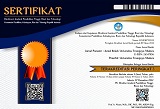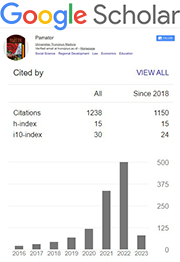Analysis of the Influence of Assessment Center and Transformational Leadership on Career Development with Social Support as Moderation
Abstract
Objective: The purpose of this study is to determine the influence of the Assessment Center and analyze the influence of Transformational Leadership on the career development of personnel in the DIY Police. In addition, this study also aims to analyze the role of Social Support, both as a factor influencing career development and as a moderator in the relationship between the Assessment Center and Transformational Leadership and the career development of personnel in the DIY Police.
Methods: The population in this study amounted to 10,365 personnel in the Yogyakarta Police, with a sample of 151 respondents selected using the Proportional Stratified Random Sampling method so that each strata in the population was proportionally represented. Data collection was carried out through a questionnaire designed on a Likert scale of 1 to 5, where a score of 1 indicated "strongly disagree" and a score of 5 indicated "strongly agreed". This instrument is used to measure the variables of Assessment Center, Transformational Leadership, Social Support, and Career Development. The data obtained were then analyzed using the Structural Equation Modeling (SEM) method with the help of AMOS software to test the direct and indirect influence of independent variables on career development, as well as the role of social support moderation in these relationships.
Results: Research shows that only Assessment Centers have a significant effect on career development, while transformational leadership and social support have no significant influence. These findings confirm that competency-based evaluations play more role in career advancement than leadership or social support factors. In addition, social support as moderation does not strengthen the relationship of other variables with career development, so career development strategies should focus more on structured assessment and training systems.
Implications: this study shows that organizations need to strengthen the Assessment Center system as a key tool in career development, by ensuring competency-based evaluations are conducted objectively and sustainably. In addition, since transformational leadership and social support have no significant effect, career development policies should be more focused on performance-based training and promotion systems rather than relying solely on leadership or the social environment.
Keywords
Full Text:
PDF (Bahasa Indonesia)References
Afrianda, A., & Arianto, T. (2023). The Effect of Professionalism, Organizational Commitment and Career Development on Employee Morale at PT. Citilink Indonesia Bengkulu Branch Office. Journal of Economics, Management, Business and Accounting Review, 3(1). https://doi.org/10.53697/emba.v3i1.1291
Ansari, M. S. A., Abouraia, M., El Morsy, R., & Thumiki, V. R. R. (2024). Influence of Transformational and Transactional Leadership on Agile Project Success: An Empirical Validation. Project Leadership and Society, 5(March), 100136. https://doi.org/10.1016/j.plas.2024.100136
Ashari, R. P., M, S. B. P., F, M. A. A., & Anshori, M. I. (2024). The Role of Transformational Leadership in Innovative Employee Performance Improvement. 1(2).
Bairizki, A. (2020). Human Resource Management (Competency-Based Strategic Review)-Volume 1. Library of Scripts.
Bryant, J., Ayers, J., Missimer, M., & Broman, G. (2021). Transformational learning for sustainability leadership – essential components in synergy. International Journal of Sustainability in Higher Education, 22(8), 190–207. https://doi.org/10.1108/IJSHE-01-2021-0014
Burhanud. (2021). Human Capital Theory As A Theoretical Foundation In Human Resource Development. Stie Semarang Journal, 13, 1–12. https://doi.org/10.33747/jurnalstiesemarang
Devita Natalia, A. J. (2024). Scientific Journal of Student Management. 4(3), 680–687. https://doi.org/10.32493/jism.v4i3
Fajriyani, D., Fauzi, A., Kurniawati, M. D., Yudo, A., & Dewo, P. (2023). Challenges of Human Resource Competencies in Facing the Digital Era (Literature Review). 4(6), 1004–1013.
Foy, T., Dwyer, R. J., Nafarrete, R., Hammoud, M. S. S., & Rockett, P. (2019). Managing job performance, social support and work-life conflict to reduce workplace stress. International Journal of Productivity and Performance Management, 68(6), 1018–1041. https://doi.org/10.1108/IJPPM-03-2017-0061
Hadi, L., Irsan Siregar, E., & Hafnidar, S. (2020). The Model Of Employee Satisfaction: A Human Resources Management Perspective. Journal of Accounting and Finance Management, 1(3), 112–125. https://doi.org/10.38035/jafm.v1i3.19
Ian, R., & Azizah, A. (2018). The concept of social support. Airlangga University Surabaya.
Islam, H., & Sarker, N. K. (2020). The Effect of Management by Objectives on Performance Appraisal and Employee Satisfaction in Commercial Banks. European Journal of Business and Management, July. https://doi.org/10.7176/ejbm/12-20-02
Istatik Amalia, N., Handayani, A., & Hartini, T. (2020). The Influence of Discussion Engineering Group Guidance on Student Career Planning. Pedagogics: Journal of Education, 15(2), 19–26. https://doi.org/10.33084/pedagogik.v15i2.1693
Kwon, K., Jeong, S., Park, J., & Yoon, S. W. (2024). Employee development and employee engagement: a review and integrated model. Career Development International, 29(2), 169–184. https://doi.org/https://doi.org/10.1108/CDI-04-2023-0117
Pamungkas, Y., & Suryanto, D. (2024). The Effectiveness of the Assessment Center in Career Development in the West Sumatra Regional Police Work Units and Units. Innovative: Journal Of Social Science Research, 4(4), 13764–13783.
Pound, D. L., Radu, O., Carsote, M., Petris, R., Valea, A., & Pound, S. (2017). Abstract #1153: Bone Assessment in Menopausal Women with Non-Hyperthyroidism Related Benign Thyroid Conditions Admitted at Two Tertiary Centeres of Endocrinology. Endocrine Practice, 23, 318–319. https://doi.org/https://doi.org/10.1016/S1530-891X(20)44283-1
Rafsanjani, H. (2019). Transformational leadership. 4(1), 1–27.
Robbins, S., A., J., & Stephen, R. (2015). Organizational Behavior. PT Index Kompleks Gramedia.
Santoso, S., Minanda, R., Swastantomo, R., Kusnadi, K., & Syarifah, L. (2022). The Relationship of Job Characteristics, Compensation, and Transformational Leadership, to Operational Performance. Business Sketches, 9(1), 34–52. https://doi.org/10.35891/jsb.v9i1.3139
Sarafino, E. P. (2011). Linking Health Communication With: Social Support. John Wiley & Sons, Inc.
Sattar, S. M. R. U., Akeredolu, O., Bogren, M., Erlandsson, K., & Borneskog, C. (2023). Facilitators influencing midwives to leadership positions in policy, education and practice: A systematic integrative literature review. Sexual & Reproductive Healthcare, 38, 100917. https://doi.org/https://doi.org/10.1016/j.srhc.2023.100917
Scroggins, J. K., Koppel, P. D., Jones-Hepler, B., Matos, L., Noonan, D., & Reuter-Rice, K. (2023). Envisioning career trajectory post-PhD in nursing: Lessons learned from a professional development project. Journal of Professional Nursing, 46, 179–186. https://doi.org/https://doi.org/10.1016/j.profnurs.2023.03.011
Sheard, A. G., & Kakabadse, A. P. (2004). A process perspective on leadership and team development. Journal of Management Development, 23(1), 7–106. https://doi.org/10.1108/02621710410511027
Vivaldi, B., & Azwar, A. (2020). The Effect of the Assessment Center Method on the Career Development of Employees of PT Bank Tabungan Negara (Persero) Tbk Head Office. Journal of Professional Administration, 1(02), 35–42. https://doi.org/10.32722/jap.v1i02.3662
Wahyudi, P. E., Heryanda, K. K., & Susila, G. P. A. J. (2021). The Influence of Career Development and Work Motivation on Employee Performance at Puri Lumbung Cottages Restaurant and Spa Munduk. Journal of Hospitality and Tourism Management, 4(1), 1. https://doi.org/10.23887/jmpp.v4i1.30921
Yukl, G. (2012). Effective leadership behavior: What we know and what questions need more attention. Academy of Management Perspectives, 26(4), 66–85. https://doi.org/10.5465/amp.2012.0088
DOI: https://doi.org/10.21107/pamator.v18i2.30174
Refbacks
- There are currently no refbacks.
Copyright (c) 2025 Robertus Bima Adhi Nugroho

This work is licensed under a Creative Commons Attribution-ShareAlike 4.0 International License.
Jurnal Pamator : Jurnal Ilmiah Universitas Trunojoyo by Universitas Trunojoyo Madura is licensed under a Creative Commons Attribution-ShareAlike 4.0 International License.















.png)